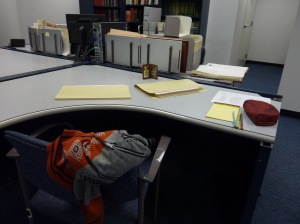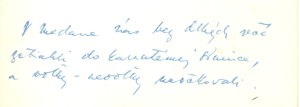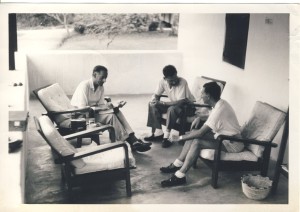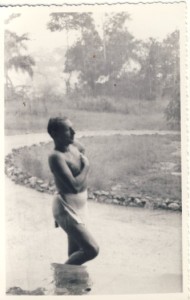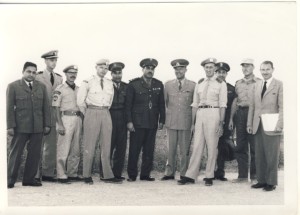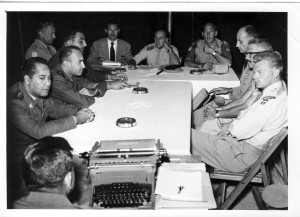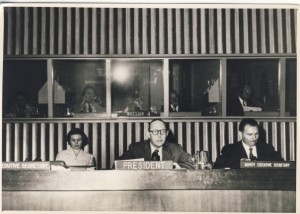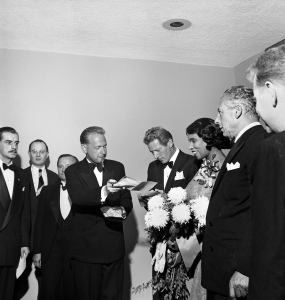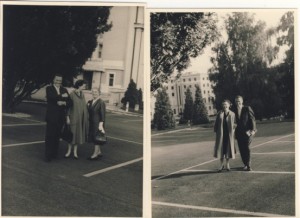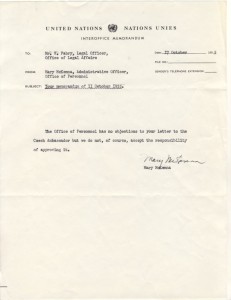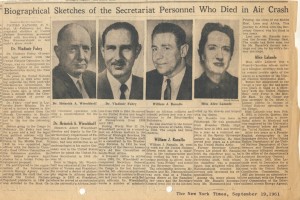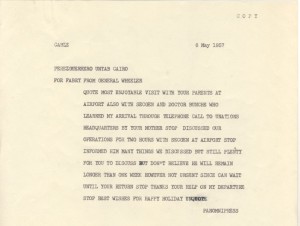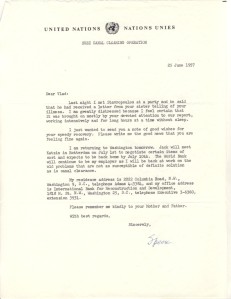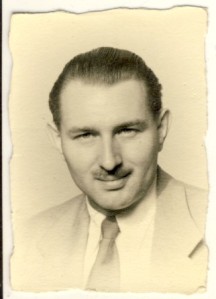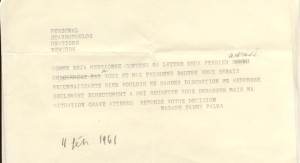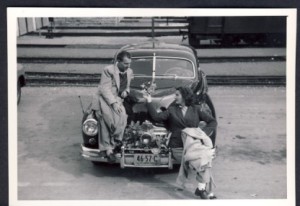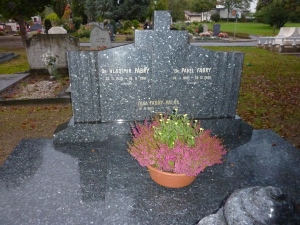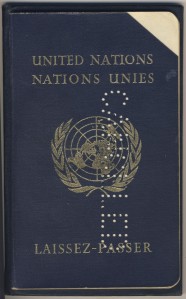

IN TRIBUTE
The entire staff of the United Nations mourns the sudden and tragic death of the Secretary-General, Dag Hammarskjold, and our other colleagues who lost their lives in the service of the United Nations: Heinrich A. Wieschhoff, Vladimir Fabry, William Ranallo, Alice Lalande, Harold M. Julien, Serge L. Barrau and Francis Eivers.
Our deep sense of shock and grief on hearing of their passing is all the deeper because we knew and respected them as colleagues; because we knew, admired and shared, each in his or her own way, their devotion to the ideals of the United Nations. The entire staff of the Organization extends sincere condolences to their families in their sadness.
R.V. Klein, Chairman, Staff Committee
IN THIS HOUSE
During these somber days, many of us have known a feeling of unreality. The world’s tragedy is to us a most grievous personal loss, not easy to speak of and not easy to accept.
Never before has this house been so full of quiet sadness and never before have we had so little to say to each other.
At the bleak opening of the General Assembly we began to realize, as perhaps we had not before, how much of our identity as members of the Secretariat was found in Mr. Hammarskjold, head of this house.
Sometimes thankful for the work which has had to be done, sometimes unable to do it, we have struggled to persuade ourselves that the routine jobs are not so irrelevant and unimportant as they now seem, knowing quite well that the best way we can pay tribute to those who died is to draw strength from their example and carry on as usual–better than usual.
——————————————————————————————–
Captain Per Hallonquist
Captain Nils-Eric Aarhreus
2nd Pilot Lars Litton
Flight Engineer Nils Goran Wilhelmsson
Air Purser Harald Noork
Radio Operator Karl Erik Rosen
and
Warrant Officer S.O. Hjelte
Private P.E. Persson
These six members of the air crew and the two soldiers of the Swedish 11th Infantry Battalion serving with the ONUC were members of the Secretary-General’s team on his last flight. Their death is part of our great loss and we include their families, their friends and their countrymen in our thoughts.
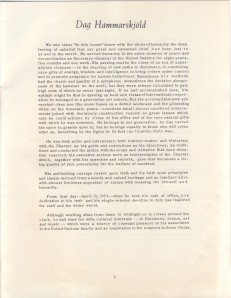

Dag Hammarskjold
We who labor “in this house” share with the whole of humanity the deep feeling of unbelief that our great and esteemed chief has been lost to us and to the world. He served humanity in the noble mission of peace and reconciliation as Secretary-General of the United Nations for eight years, five months and one week. His passing marks the close of an era of unparalleled richness — in the charting of new paths in diplomacy, in combining rare gifts of energy, wisdom and intelligence to bring crises under control and to promote programs for human betterment. Sometimes his methods had the charm and quality of a symphony; sometimes the decisive abruptness of the hammer on the anvil, but they were always calculated to gain high ends of which he never lost sight. If he had accomplished less, his epitaph might be that in opening up bold new vistas of international cooperation he belonged to a generation yet unborn. But his accomplishments are myriad–they are like snowflakes on a dotted landscape and the glistening white on the mountain peaks–countless small almost unnoticed achievements joined with decisively constructive results on great issues which only he could achieve by virtue of his office and of the rare natural gifts with which he was endowed. He belongs to our generation; he has carved his name in granite upon it; but he belongs equally to those who will come after us, benefiting by the lights he lit that can illumine their way.
He was both actor and interpreter; both history-maker and historian; with the Charter as his guide and resolutions as his directives, he mobilized and conducted the action with the scope and initiative that each situation required; his executive actions were an interpretation of the Charter which, together with his speeches and reports, gave the document a living quality of rich potentiality for the welfare of mankind.
His unflinching courage rested upon faith and his faith upon principles and ideals derived from a sturdy and valued heritage and an intellect alive with almost limitless appraisal of values with meaning for himself and humanity.
From that day–April 10, 1953–when he took his oath of office, his dedication to the task and his single-minded devotion to duty has inspired the staff and the wider world.
Although working often from dawn to midnight or in crises around the clock, he had time for wide cultural interests — in literature, drama, art and music — which were a source of constant pleasure to his associates in the United Nations family and an inspiration to the masters in these fields.
His deep inner stillness was a mainspring of his strength — a fortress so strong that disappointments, failures, setbacks and even personal attacks could not weaken his will or compromise his resolution to carry on his great task. His interest in the Meditation Room was a deeply personal one, not only aesthetic. He wrote the words on the entrance — “This is a room devoted to peace and those who are giving their lives for peace. It is a room of quiet where only thoughts should speak.” He went there frequently for quiet reflection, knowing that retreats into loneliness were a source of strength for the struggle.
Our sorrow and grief for the one who led and inspired us, extend equally to all those who died with him. In life, Heinz, Vladimir, Bill, Alive, Harry, Serge and Francis were selfless in their interests, devoted to their tasks and dedicated to the noble cause of peace which the United Nations represents. Along with him they will be hallowed in precious memory. In future it will be said of them that they died with their chief in the line of duty.
Let us not be ashamed to shed some tears over our loss, nor shrink from reflection of the void that has been created for us and the world, but let this be a part of our rededication to the task which he so nobly advanced. His concern for the staff marked by two visits to all of our offices, and in countless other ways must now be matched by our increased concern for the future of the United Nations. His greatest concern would be that the staff should carry on with new resolve and in a spirit of magnificent cooperation. Our greatest tribute to him will be our continuing individual and collective efforts, by following his glorious example, to strengthen the edifice of peace.
His words taken from the pamphlet that he wrote for visitors to the Meditation Room, now have a prophetic meaning, a charge from him to all of us: “It is for those who come here to fill the void with what they find in their center of stillness.”
— Andrew Cordier

The Secretary-General
In Memoriam
There are many, I am sure, who knew him longer. I would claim, however, that there cannot be many who could have admired and respected him more.
He was, to all appearance, cold, aloof and remote. And yet I have seen him time and again show a compassion for human frailty and an understanding of human foibles which made him more human than anyone could have guessed.
Flattery angered him. And yet, when some of his colleagues showed an understanding of the subtlety of his ways, he was genuinely pleased.
Subtle he was–so subtle that one sometimes wondered what he meant when he said something. And he never said a foolish word.
He was one of nature’s aristocrats–with a contempt for anything that was a sham or in the least shoddy or second rate.
He had a mind which could grasp a complicated problem at one go; at the same time he had a mastery of detail which was phenomenal.
His hospitality knew no limits. He was generous and forgiving, even to a fault.
In the pursuit of his goals he was clear headed and quick, sometimes seemingly too quick. But then, in this pursuit, while his speed was tempered by his political judgement, he never allowed expediency to slow him down or give him second thoughts.
He was a tireless worker. His stamina was truly astonishing. It was difficult for most of his colleagues even to keep up with him.
He made a unique contribution to the theory of internationalism. In this regard, the Introduction to the Annual Report, every word of which he wrote himself, may well be regarded as his last Will and Testament.
He died, as he lived in the last eight years and more, in quest of peace.
His death, so sudden and so cruel, is a tragic loss not only to the United Nations whose prestige he raised to such heights, but to the entire world.
—C. V. Narasimhan

WILLIAM RANALLO
Almost everyone in the Secretariat knew Bill and many of us had the privilege of working with him. Probably no other member of the staff had so many warm friends. And every one of us remembers some act of kindness, of thoughtfulness, of genuine friendship that Bill rendered for us without fanfare of any sort, readily and cheerfully.
As I write this I am wearing a pair of glasses with a very peculiar frame, one side of it held together with a screw. My frame broke last Thursday. There was no time to go to an optician. Bill undertook to fix it then and there, and although he was preparing to leave on his trip with the Secretary-General, he insisted on doing it, because he said it would not be safe to drive home at night with a broken frame.
So many of us will remember him not in generalities but in a multitude of similar acts of thoughtfulness. The son of one of our colleagues will remember him as the man who fixed his toys. Others will remember his sound practical advice on what to do, whom to see, where to go, how to cope with a difficult problem. Many a staff member will remember him for the interest he took when they were in trouble and the discreet and tactful way in which he helped. Bill made it his job to be open and sensitive to the needs of all his colleagues.
William J. Ranallo was born on February 21, 1922, in Pittsburgh, Pennsylvania. He worked at the Sperry Gyroscope Plant at Lake Success and from 1942 to 1946 served in the United States Army. One of his assignments was as chauffeur and guard at the estate of President Roosevelt at Hyde Park. In March 1946 he joined the Secretariat.
At first Bill was assigned as personal chauffeur to the Secretary-General. Because of his outstanding personal qualities, his efficiency, his thoroughness, his devotion to his duties and his complete dependability, Mr. Lie appointed him as his Personal Aide.
Mr. Hammarskjold gave him still larger responsibilities, particularly in connexion with security arrangements for the Secretary-General both at Headquarters and on his numerous trips. He accompanied the Secretary-General on all his missions and he grew in stature with his job. He had a rare quality of fitting in perfectly into all sorts of unusual situations. He was easily at home at formal receptions, with heads of State and other top officials of Member Governments, among security officers in the various capitals, among civilian colleagues and among the Field Service staff on UN missions.
He met people face to face, directly, straight-forwardly, with a delicately balanced combination of due regard for their official position and genuine interest in them as human beings. And this is why he was never at a loss for something interesting to say to them, or to contribute, at the right moment, to the general talk. His good humour was never-failing. It was a part of the energy and personal warmth he brought to his job. Above all, he was wholly dedicated to his task, that of assisting his chief, the man who bore so heavy a burden of history, in all the thousands of daily arrangements, to guard him against petty annoyances and irritations, and above all to guard his life.
To Bill’s father and mother, Mr. and Mrs. N. Ranallo, his wife, Eleanor, his son, Richard and his step-sons, Richard A. Gaal and William H. Gaal, the members of the Secretariat extend their deepest sympathy.
HEINRICH A. WIESCHHOFF
Heinrich A. Wieschhoff was Director and Deputy to the Under-Secretary, Department of Political and Security Council Affairs. He joined the United Nations Secretariat in 1946 with a most distinguished record of African studies behind him, both at the University of Pennsylvania and with the United States Government, and spent fourteen years in the Department of Trusteeship where he rose from consultant to Director. Called upon to organize research surveys on Trust Territories, he soon was playing an increasingly important role in all aspects of Trusteeship affairs. He was one of the leaders among the group of officials who built up the Department and helped to guide it in its far-flung activities until it can now look forward to the completion of its mission under the Charter.
His unequaled experience and wide contacts with African political leaders led him to be called upon increasingly with regard to the political problems that would arise for the United Nations in connexion with the accession of many African colonies to independent Statehood. It was therefore natural that the Secretary-General should turn to him in connexion with African affairs as that continent, with its many problems, burst into the forefront of world politics. He accompanied Mr. Hammarskjold on most of his trip through Africa in the winter of 1960. Subsequently, he was appointed Director of the Department of Political and Security Council Affairs.
Mr. Wieschhoff became one of the Secretary-General’s most intimate political advisers on Africa, assisting in the formulation of Congo policies and other African questions in regard to which political responsibilities devolved upon the the Secretary-General.
Mr. Wieschhoff was wholly devoted to the United Nations and to the cause of peace. He had a brilliantly sharp and penetrating mind which he applied not only to the analysis of political processes, but also to creative political action in conformity with the purposes and principles of the Charter.
He was a scholar, a man subject to the discipline involved in the pursuit of truth in the way of the scholar. The scholar’s discipline is sometimes stern and this was typical of Wieschhoff. He was an exacting taskmaster, particularly towards himself. He was always on guard against any kind of falsity or pretense. This at times caused him to be falsely judged as cynical. Those who knew him well saw beneath the gruff exterior, the man of high principle and lofty ideals. Many of us who were fortunate enough to enjoy his personal friendship will never forget his charm and kindness.
He worked a regular seven-day and seven-evening week, seldom took more than a few days’ leave, yet always maintained his dynamism, his good spirits, and his ability to act creatively and purposefully for the cause of peace. He was a leader among men, a valued and respected chief, and to many, a dear friend.
His untimely death has left a tragic void in the Secretariat, but especially in a closely knit family. In their hour of anguish, Virginia Wieschhoff and their three children, Heinrich, Eugenia and Virginia, know that the rich heritage which he has left them cannot be erased even by death.

ALICE LALANDE
Throughout her many years with the United Nations, most of them spent in the field, Alice never allowed hard work, physical hardship, or personal danger disturb her serene conviction that the job at hand must be done: now and well.
To those who worked with her, she will remain a source of inspiration as the devoted, self-possessed and unobtrusively efficient colleague that she was. For her many friends, the memory of a delicate, understanding and warm human being lives on. Who could forget her quiet smile, her ready response to a witty remark, the gay sparkle in her eyes?
Alice traveled the world in service of the United Nations. As secretary to Count Folke Bernadotte, UN Mediator in Palestine, she was on the Island of Rhodes and the borders of Syria and Lebanon when the armistice agreements were signed in 1948. She worked in Palestine for General Riley, UNTSO Chief of Staff, and for his successor, General Vagn Bennike. At the first and second UN International Conferences on the Peaceful Uses of Atomic Energy in Geneva, Alice was secretary to Professor Whitman, the first Secretary-General, and to Dr. Eklund, the second. She also served with the Department of Economic and Social Affairs at Headquarters, at UNESCO in Paris, and as an Administrative Assistant with the Preparatory Commission and first General Conference of the International Atomic Energy Agency in Vienna.
Alice is also remembered with warm affection in Gaza where she was secretary to Brigadier-General Rikhye, UNEF Chief of Staff, and in the Congo where she worked first for Ambassador Dayal and later for Dr. Sture Linner, Officer-in-Charge of the UN Operation in the Congo. While on duty in the Congo she accompanied Mr. Hammarskjold on one of his trips to South Africa.
We all share her family’s deep sense of bereavement. To those who were so dear to Alice–her father, her sister, Annette, and her brother, Abbé Lalande — goes our heartfelt sympathy in a loss which is also ours.

VLADIMIR FABRY
Dr. Vladimir Fabry, who spent almost all of his professional life in devoted and active service for the United Nations, combined to an unusual degree intellectual and physical vigor with personal charm and warmth.
When, in 1946 at the age of 25, he came to the United Nations, he held a Doctorate in Law and Political Science from the Slovak University and had completed graduate studies in Economics at the University of Bratislava; he had served in the Czech resistance movement during German occupation, had taken part in organizing the new Czech Government in liberated areas, and had been the Executive Assistant to the Minister of Commerce.
His adaptability, sound judgement and capacity for hard work made him a singularly valuable officer for mission duty, and his assignment were many and of ever-increasing responsibility. Among these were his two years’ service as Legal Affairs Officer with the Security Council’s Committee of Good Offices in the Indonesian Question in 1948, service on the UN Plebiscite in Togoland under UK administration and his particularly responsible and successful work in the Suez Canal Clearance operations for which he was commended by General Wheeler, the Secretary-General’s special representative. His service as Legal and Political Adviser with UNEF in the Middle East was, early this year, cut short by his being sent to Léopoldville as Legal Adviser with the UN Operations in the Congo, in which capacity he was accompanying the Secretary-General to Ndola on 18 September.
To his more difficult tasks Dr. Fabry brought the disciplined energy, courage, and careful preparation characteristic of a serious mountain climber–which, in fact, he was.
An enthusiastic sportsman — expert skier and horseman as well as mountaineer — Dr. Fabry was concerned to share these interests and, far from scorning the beginners or less agile among his friends and co-workers, encouraged them. He himself frequently enjoyed a solitary climb to his office on the thirty-fourth floor, a feat discovered by a colleague who, after seeing him emerge from a staircase door, jokingly asked whether he had walked upstairs and was answered with a quick smile and “yes”.
The loss of a man of such buoyant spirit, serious purpose and personal warmth leaves his colleagues and and friends sadly bereft. They share and sympathize with the great sorrow of Mrs. Fabry, his mother, and his sister, Olga.
SERGE L. BARRAU
Serge Barrau joined the UN Field Service only four months ago and was immediately assigned to service with the UN Operation in the Congo. We at Headquarters did not have the privilege of knowing him, but his friend from childhood, Serge Beaulieu of the Field Operations Service, has given us this portrait of him:
[Translated from French-T.B.]
Serge and I were childhood friends. In Port-au-Prince, his parents lived on the Rue Capois, which was the meeting place for all young people and very often the point of departure for the creation of all kinds of clubs, literary, sports and worldly. When it came to cultural events, sports or worldly, it was safe to rely of the presence and collaboration of Serge.
Strong-muscled, medium-sized, always a little smile drawn with languorous eyes under an imposing profile, he was loved by all. He had a passion for physical fitness. In football, which was also one of his favorite sports, he had the physical superiority which resulted in making him a feared and competent player. Above all, Serge Barrau was an intelligent element that could boast to have belonged to the true conscious intellectual youth of Haiti.
In spite of all these qualities and advantages, Serge was modest. He had tact, discipline in ideas, logic, which made him the arbiter in all discussions.
Separated after our studies, we met again in May this year on mission for the United Nations Organization, in Léopoldville. We had so much to say on that day. He told me about his activities in New York, his stay in the US Army where he performed his military service, his travels in Asia, particularly in Japan, where he received the baptism of fire, during a particularly dangerous drive, of moving crawling under machine gun fire, wherein the slightest imprudence can cost you your life; this training, he told me, this is my pass to the Congo. He was happy to be at the UN, to see me and to know Africa, the Africa of our ancestors.
It did not take long to prove his abilities in the UN Security Office where, newly arrived, he was assigned as assistant-investigator responsible for protecting the United Nations staff in trouble with the police.
Serge did not talk much, he did not trust himself to everyone, but he had an ideal, he wanted the initials of his name to be an example of courage and virtue to youth entire. That’s why I take pleasure in repeating his phrase which has become a reality.
S.B. – Serge Barrau – Servir bien
All his friends and colleagues express deep sympathy to Serge’s mother and father, Mr. and Mrs. Joseph Barrau, and to his brothers and sisters in their great loss.

HAROLD M. JULIAN
When Harry Julien left the United States Marine Corps and joined the UN Security Force in 1952 he felt that he had found a new opportunity for service, one to be looked upon as a “great challenge”. He never lost this attitude towards his job, though he seldom spoke of it. It was in this spirit that he accepted a years’ assignment to the Spinelli Mission in Jordan in 1958 and to the Congo Mission in July of last year.
He was an active man with wide interests, among which the Marine Corps stood high. The saying “once a Marine always a Marine” was particularly true of him. He was an enthusiastic athlete, a fine swimmer and diver.
From choice he became an “outside man” on the Guard Force and so a familiar figure on First Avenue to all of us. Familiar too, in the Staff Council, was his determination that the Guard Force should be “the best it could be”; to this idea he was dedicated. He had a warm interest in other people and a very human approach which made him exceedingly good at his job. He thought little of personal comfort and, whatever the weather or his hours of duty, he was always the same, a man of natural good humour and kindliness with a cheerful smile.
In losing him, we all share the sorrow of his mother and father, his widow, Maria, and his sons, Michael and Richard.
FRANCIS EIVERS
Frank Eivers, an unassuming, soft-spoken Irishman from Bally Bay and the Dublin Police Force, joined the UN Field Service in 1956. Those who worked with him during the four years he served with UNTSO in Jerusalem and the year he served in the UN Mission in the Congo speak with admiration of his outer gentleness and inner strength, “a thread of steel”, which made him into a man who met crisis with calm, personal hardship with philosophical humour, and the need of a friend with generous and utterly reliable friendship.
Frank was a methodical man–with a whimsical sense of fun. He was a keen player of Gaelic football and endowed with extraordinary physical grace. He was also a splendid cook and his friends say with affection that only an Irish imagination could have invented some of his ways with fish.
He is remembered, too, for a most loyal devotion to his job; for many small, unselfish acts of kindness to his colleagues, and for the quiet “God bless” with which he closed every conversation.
Frank was married only one month ago, and it is with great personal sadness that we express our heartfelt sympathy to his widow, Marie, to his mother and father and sisters in the loss which we share.

A MESSAGE FROM THE PRESIDENT OF THE GENERAL ASSEMBLY
The Sixteenth Session of the General Assembly met last week in the shadow of tragedy, stricken by profound grief at the death of Mr. Hammarskjold and those members of the staff who died with him in the service of the United Nations.
Not in this Organization only, but in every corner of the troubled world, men now mourn his death because by dint of unceasing labour and selfless devotion he had come in himself to embody the ideals of the United Nations.
For all of us the task is heavier and the road darker without his courage and wisdom and without the devotion of his companions in death.
Shock and grief have shaken us to the heart, yet we must not permit them to weaken our resolve. The world pays its heartfelt tribute of grief, in which we join: but for those who had the honour of working closely with him, and especially the Secretariat, to whom his example was a perpetual inspiration, there is granted the privilege of offering a more fitting homage. It is to be rededicated to the unfinished work he and his companions had so far nobly advanced. This of all tributes is the one he would have most honouored and desired.
Let us, therefore, resolve to be worthy of the vocation to which we are called. Let his own words, addressed on the eve of his final mission, to the Secretariat in which he took such pride, and which he had sought to model in the image of his high view of its destiny, become the watchword for the future. Let all “maintain their professional pride, their sense of purpose, and their confidence in the higher destiny of the Organization itself, by keeping to the highest standards of personal integrity in their conduct as international civil servants and in the quality of the work that they turn out on behalf of the Organization”.
His death will not be the pointless and cruel calamity it now seems if everyone now stunned by grief determines to bend every effort to strengthen the United Nations as an instrument of peace.
As President of the General Assembly I can ask nothing more of the Secretariat than that with his example fresh in your minds you should resolve to set your feet firmly on the hard but rewarding path marked out by his wisdom and high purpose. I am confident that you will do so.
—Mongi Slim



























